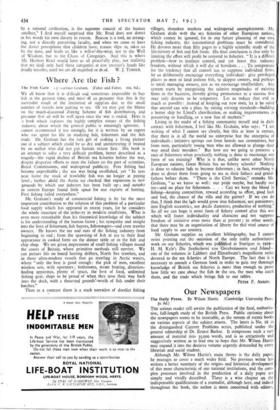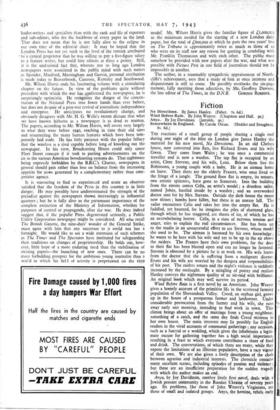Our Newspapers
The Daily Press. By Wilson Harris. (Cambridge University Press. 3s. 6d.)
THE serious reader still awaits the publication of the final, authorita- tive, full-length study of the British Press. Public curiosity about the newspapers seems m be insatiable, as the stream of recent books on various aspects of the subject attests. The latest is No. 18 in the distinguished Current Problems series, published under the general editorship of Dr. Ernest Barker. It compresses such a vast amount of material into 35,000 words, and is so attractively and suggestively written as to lead one to hope that Mr. Wilson Harris may expand it into the decisive volume urgently demanded by every librarian and social student.
Although Mr. Wilson Harris's main theme is the daily paper, he manages to cover a much wider field. No previous writer has written a better summary of the origins and' historical development of this most characteristic of our national institutions, and the com- plex proCesses involved in the production of a daily paper are simply and vividly described. There is a wise chapter on the indispensable qualifications of a journalist, although here, and indeed throughout the book, the author is more concerned with editors,
leader-writers and specialists than with the rank and file of reporters and sub-editors, who Are the backbone of every paper in the land. That does not mean that he is not fully alive to the eclipse in our own time of the editorial chair: It may be hoped that the London Press has not yet sunk to the level of the remark attributed •
to a cynical proprietor that he was willing to pay a five-figure salary to a feature writer, but could hire editors at three a penny. Still, it is the undoubted fact that, whereas not so long ago London newspapers were associated in the public mind with such names as Spender, Mudford, Massingham and Garvin, personal attribution is made today to Beaverbrook, Camrose, Kernsley and Southwood. Mr. Wilson Harris ends his fascinating volume with a stimulating chapter on the future. In view of the problems quite without precedent with which the war has confronted the newspapers, he is surprisingly optimistic. He recognises the danger of the concen- tration of the National Press into fewer hands than ever before, but does not despair of a post-war revival of journalistic independence and enterprise. He anticipates no revolutionary change, and obviously disagrees with Mr. H. G. Wells's recent dictum that what we have known hitherto as a newspaper is as dead as mutton. The papers, according to Mr. Wilson Harris, will revert very largely to what they were before 1940, reaching in time their old sizes and resurrecting the many human features which have been tern- ,porarily laid aside. He has little patience with the popular fallacy that the wireless is a rival capable before long of knocking out the newspaper. In his view, Broadcasting House could only cause Fleet Street .concern if it took to putting advertisements on the air as the various American broadcasting systems do. That nightmare being expressly forbidden by the B.B.C.'s Charter, newspapers in general should gain rather than lose on balance from the increasing appetite for news generated by a complementary rather than com- petitive agency.
It is reassuring to find so experienced and acute an observer satisfied that the freedom of the Press in this country is in little danger. He may possibly have underestimated the strength of the prejudice against the newspapers shown increasingly in influential quarters ; but he is fully alive to the paramount importance of the complete extinction of the Ministry of Information, whether for purposes of control or propaganda, after the war. He does indeed suggest that, if the popular Press degenerated seriously, a Public Utility Corporation newspaper might he considered. All who recall The British Gazette, the nine-days' wonder of the General Strike, must agree with him that any successor to it could not last a fortnight. He would like to see a wide extension of such schemes as The Times and The Spectator have instituted for safeguarding their traditions on changes of proprietorship. He holds out, how- ever, little hope of a more enduring need than the stabilisation of existing papers—the launching of new ones. There can be no more forbidding prospect for the ambitious young journalist than a world in which his fieH of activity is perpetuated on the 1939 model: Mr. Wilson Harris gives the familiar figure of £1,000,003 as the minimum needed for the starting of a new London daily paper, but the total of £600,000 at which he puts the two years' loss on The Tribune is .pproximately twice as much as those of us who were on its staff saw any reason for quoting in condoling with Mr. Franklin Thomasson and with each other. The public must somehow be provided with new papers after the war, and what was possible with Picture Post in one field of journalism should not be impossible in another.
The author, in a reasonably sympathetic appraisement of North- cliffe's achievement, says that a study of him at once intimate and dispassionate is still to come. He possibly overlooks the six-page memoir, fully meriting those adjectives, by Mr, Geoffrey Dawson,
the late editor of The Times, in the D.N.B. GORDON ROBBINS.



























 Previous page
Previous page